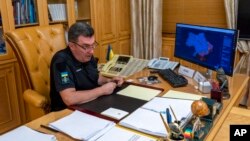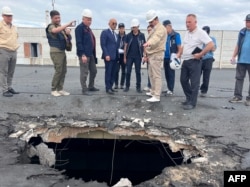Oleksiy Danilov, the secretary of Ukraine's National Security and Defense Council, voiced frustration that Russia remains in control of his nation's Zaporizhzhia nuclear power station in an interview with VOA's Ukrainian Service. He also warned of the risk of a nuclear catastrophe similar to the Chernobyl nuclear accident in April 1986 that killed dozens of people and forced more than 100,000 to evacuate their homes.
An inspection team from the International Atomic Energy Agency visited the Zaporizhzhia plant last week amid rising fears prompted by the placement of Russian military assets around the plant and weeks of shelling in the vicinity, blamed by each country on the other.
Russia captured the plant in the early days of its invasion of Ukraine, which it says is justified by the military threat posed by Kyiv's increasing closeness to NATO and Western powers. Ukraine says the invasion constituted unprovoked aggression and accuses Russian forces of war crimes and "terrorism."
Ukrainian engineers continue to operate the plant under Russian supervision, and two IAEA inspectors have remained at the site to monitor for threats to its safety. At a U.N. Security Council meeting called at Russia's request, Secretary-General Antonio Guterres underlined Tuesday the need to deescalate the situation around the plant.
Here is a transcript of the interview with Danilov, which was conducted before the Security Council meeting. It has been edited for clarity.
VOA: What is your assessment of the IAEA's mission and how did its outcomes affect the solution to the Zaporizhzhia nuclear power situation? How can this issue be resolved?
Oleksiy Danilov: Look, I want us all to place the accents that need to be placed. First of all, terrorists seized a nuclear facility in the 21st century, which is extremely dangerous. [These are] people who do not know how this system is managed or how it works.
Terrorists are offering a meeting of the U.N. Security Council. Do you even understand what is happening? This is complete nonsense. These are the things that cannot happen in the modern world. The IAEA inspection arrived, which, in my opinion, should have been there the same day [the plant] was seized by terrorists. They did not let the press in, and [they] left. Their representatives stayed there; we do not understand what is happening there. This is the object of increased danger, which is being kept in terrorists' hands today. I don't even know how to say it.
Unfortunately, our country had a very tragic experience in April 1986. Does the Russian Federation at the heart of these terrorist groups that invaded our territory want to repeat it today?
This is a very dangerous thing. I will explain it: It is a high-risk facility, a nuclear facility, the largest nuclear plant in Europe, and if something happens there and a chain reaction follows, we cannot even imagine today the number of victims that these terrorists can cause, and that would be not only on the territory of our Ukraine.
The point is that if, God forbid, this cloud is moving in one or other direction, which only depends on the wind, then neither Europe, nor Turkey, nor other countries will want this to happen. And unfortunately, the world believes that nothing bad is happening and in my opinion are quite sluggish in responding to all these things.
The IAEA mission came [to inspect the plant], but no one is saying directly that it is terrorists who have captured the nuclear facility. And this is what the world should be talking about. [The international community] begins, let's say, to discuss [variables] that are not related to this issue, [but the categorical criminality of this situation] is a fundamental thing [that needs to be discussed].
Do you remember when pirates captured ships? They were immediately repulsed, and here the whole world is simply watching how it will all end. Colleagues, friends, this is a very dangerous situation, I emphasize once again. This is the object of increased danger. And just close your eyes like that — arrive there, look around for 2-3 hours, turn around and leave, and then what?
We insist that there should be no terrorists there; [the plant] must be under the control of specialists of the country on [whose] territory it is located, and it is called Ukraine. Other specialists cannot be there, because it is our responsibility for this process. Therefore, remove the terrorist group from there.
VOA: The occupation of the Zaporizhzhia plant has been going on for the past several weeks. What is needed to make a decision to demilitarize it? What is Ukraine doing to achieve it and what are the prospects?
Danilov: The president of our country, the minister of foreign affairs of our country, everybody who is involved in this, is doing everything possible and impossible in order for this situation to stop. But I emphasize once again, the world must stop being sluggish in this matter, that is what we are talking about.
The U.N. should make this decision at its meeting. But what is actually happening is that if we look into the decision-making procedure, the Russian Federation has the right to veto. That is, the terrorist has the right to veto any decision. What else needs to be said about this? We do not know whether they will accept it or not. The thing is that for them, people are like, I apologize [for my language], some kind of junk. They don't value human life.
This interview originated in VOA's Ukrainian Service.





